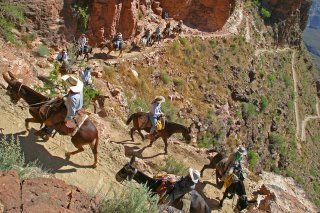
 Have you ever felt depleted, exhausted, too tired to go on, or emptied of desire to continue the job before you?
Have you ever felt depleted, exhausted, too tired to go on, or emptied of desire to continue the job before you?
A reader reported that when embarking on a mule ride down into the Grand Canyon, the lead wrangler warned all riders that when they got to the bottom, their mules would stop moving. He said the mules would not be tired—they could go another 30 miles—but he said “YOU are the one who will be tired, and they will sense that, slowing to a crawl and acting like they can’t take another step. He instructed all riders to keep their animals moving and not let them slow down.
When reaching the bottom, the reader said the mules halted just like predicted, but with an appropriate swat of determination from each rider to keep on going, the mules kicked back into gear and finished the trip.
When feeling exhausted, we often blame the body for the feeling of lack. Excuses come to mind like “My energy is all gone. I’ve worked too long. The task is too hard.” But how often is the real cause of depletion a drop in attitude and desire within, taking the form of, “I don’t want to do this anymore? I’m failing so might as well give up? I’d rather be doing something else? I don’t want to work so hard?”
My everyday work is very metaphysical, so I have no excuse for complaining of physical exhaustion, but I can relate to the feeling of mental depletion leading to physical exhaustion from playing in tennis tournaments.
I’ve noticed that when I’m winning, I have no end of energy to finish the game, no matter how long it takes. But twice, in the past, when losing severely, somewhere mid-game I can remember becoming so tired and weary that I didn’t think I could even finish.
What was the difference between feeling great when winning and exhausted when losing?
During those two times when I caught myself dragging around on court, I did argue my way back to strength and energy. I realized that the weariness in my body was not physical at all. It was weariness in thought from being worn down by intimidation and fear of my opponent’s superior skill and talent.
I thought about what Mary Baker Eddy wrote in Science and Health:
“Without mind, could the muscles be tired? Do the muscles talk, or do you talk for them? Matter is nonintelligent. Mortal mind does the false talking, and that which affirms weariness, made that weariness.”
My body was not tired, I reasoned. My thought was tired, and I needed to remember the spiritual reasons why I was playing the game in the first place.
My goal was not to beat my opponent. My goal was to tangibly express ability, intelligence, coordination, grace and skill in an athletic endeavor. These goals remained the same whether or not I had the most points.
While remembering the spiritual purpose of my game, I was able to put distress about losing out of my mind and regain my energy and strength. Both times I finished my games in fit healthy shape, ready to play again.
The physical body often acts like the mules at the bottom of the Canyon trail. It balks, halts, limps along and complains making us think we can go no further. If misled in our conclusions we believe the body is the complainer, when actually it’s our tired thought objectifying itself into the condition of the body.
So, the moral of the story is—no more mule thinking!
Exercise your God-given authority to be well and strong at all times, remembering the spiritual motive behind your task to begin with that keeps the body in its proper place of being ruled, and not being the ruler!
Happy trails.
